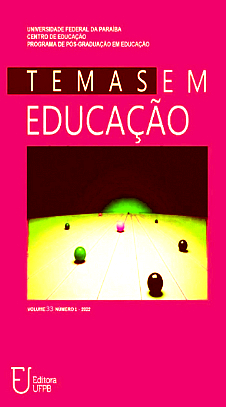O PASSADO QUE NÃO PASSA
violação aos direitos humanos de mulheres durante a ditadura civil militar em Goiás, Brasil (1964-1985)
DOI:
https://doi.org/10.22478/ufpb.2359-7003.2024v33n1.70672Keywords:
Mulheres, Direitos Humanos, ditadura militar.Abstract
This work investigates the violation process of human rights that took place during the Brazilian military dictatorship since women’s reports who were subjected to physical and psychological torture. For this we used testimonies of the book "Military Dictatorship in Goiás: testimonies for history", organized by Pinheiro Salles, a former political prisoner who conducted the interviews based on oral history methodology. In this sense, this article is part of the thesis "Open memory: university and female resistance in the military dictatorship in Goiás" which was presented at the Department of Education from the Universidade Federal de Goiás, in 2017. Here the objective is to demonstrate that some aspects of the violence suffered by women reflect misogynist social values that existed before and go beyond dictatorships, once they belong to the very society that originates this violence.
Downloads
References
ALBUQUERQUE JÚNIOR, D. M. de. A mobilização das carnes: história, desejo e política ao rés dos corpos. História da Historiografia: International Journal of Theory and History of Historiography, Ouro Preto, v. 16, n. 41, p. 1–23, 2023. DOI: 0.15848/hh.v16i41.2005. Disponível em: https://www.historiadahistoriografia.com.br/revista/article/view/2005 . Acesso em: 24 abr. 2024.
BRASIL. Decreto nº 7.037, de 21 de dezembro de 2009. Aprova o Programa Nacional de Direitos Humanos — PNDH-3 e dá outras providências. Brasília, DF: Presidência da República, 2009. Disponível em: http://www.planalto.gov.br/ccivil_03/_Ato2007-2010/2009/Decreto/D7037.htm . Acesso em: 10 fev. 2010.
______. Comissão Nacional da Verdade. “Tortura”. In:______. Relatório da Comissão Nacional da Verdade. Brasília: CNV, 2014a. v. 1, cap. 10. p. 399-498.
CARDIA, Nancy; ADORNO, Sérgio; POLETO, Frederico. Homicídio e violação de direitos humanos em São Paulo. Violência • Estud. av. 17 (47) • Abr 2003. Disponível em : https://www.scielo.br/j/ea/a/KKykzm5zrv9s9WSjNsLdfLr/# . Acessado em 18 abr. 2024.
COLLING, Ana Maria. A resistência da mulher à ditadura militar no Brasil. Rio de Janeiro: Record/Rosa dos Ventos, 1997.
LOZANO, Jorge Eduardo Aceves. Prática e estilos de pesquisas na história oral contemporânea. In: AMADO, Janaína; FERREIRA, Marieta de Moraes. Usos & abusos da história oral. 3. ed. Rio de Janeiro: Editora FGV, 2000.
LVOVICH, Daniel. História reciente de pasados traumáticos. De los fascismos y colaboracionismos europeos a la historia de la última dictadura argentina. In: FRANCO, M; LEVÍN, F. (Comps.). Historia reciente. Perspectivas y desafíos para un campo en construcción. Buenos Aires: Paidós, 2007.
PORTELLI, Alessandro. O que faz a história oral diferente. Tradução Maria Therezinha Janine Ribeiro. Projeto História, São Paulo, n. 14, p. 25-39, fev. 1997.
TELES, Edson Luiz de Almeida. Brasil e África do Sul: os paradoxos da democracia. Memória política em democracias com heranças autoritárias. 2007. 153 f. Tese (Doutorado em Filosofia) - Faculdade de Filosofia, Letras e Ciências Humanas, Universidade de São Paulo, São Paulo, 2007.
TELES, Maria Amélia de Almeida. Violações dos direitos humanos das mulheres na ditadura. Revista Estudos Feministas, [S. l.], v. 23, n. 3, p. 1001–1002, 2015. DOI: 10.1590/%x. Disponível em: https://periodicos.ufsc.br/index.php/ref/article/view/41946 . Acesso em: 20 abr. 2024
WOLFF, Cristina Scheibe. Pedaços de alma: emoções e gênero nos discursos da resistência. Revista Estudos Feministas, [S. l.], v. 23, n. 3, p. 975–989, 2015. DOI: 10.1590/%x. Disponível em: https://periodicos.ufsc.br/index.php/ref/article/view/41944 . Acesso em: 20 abr. 2024
Downloads
Published
How to Cite
Issue
Section
License
Copyright (c) 2024 Revista Temas em Educação

This work is licensed under a Creative Commons Attribution 4.0 International License.
Authors who publish in this journal agree to the following terms:
. Authors retain the copyright and grant the journal the right to first publication, with the work simultaneously licensed under the Licença Creative Commons Attribution that allows the sharing of the work with acknowledgment of authorship and initial publication in this magazine. . Authors are authorized to assume additional contracts separately, for non-exclusive distribution of the version of the work published in this journal (eg, publishing in institutional repository or as a book chapter), with acknowledgment of authorship and initial publication in this journal.
. Authors are permitted and encouraged to publish and distribute their work online (eg in institutional repositories or on their personal page) at any point before or during the editorial process, as this can generate productive changes, as well as increase impact and citation of the published work (See O Efeito do Acesso Livre).



















